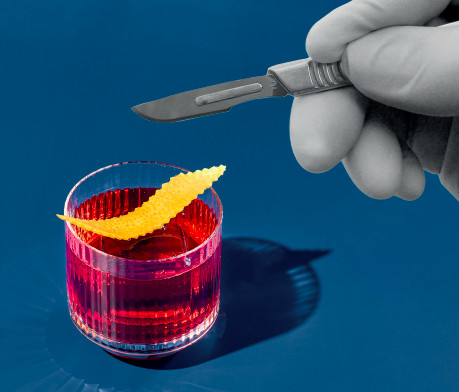
Classics are an obsession for Jake O'Brien Murphy, particularly in the way they keep pace with the times and changing tastes.
We’re dissecting classic cocktails. Ready the contentious opinion klaxon. I am professionally obsessed with them. Mainly because they have ascended to a shared cultural understanding between bartenders and the wider human race.
By their very nature, classics have tapped into some kind of winning formula – a near-unanimous historical thumbs up. Do you know how hard it is to get people to agree on anything sensible?
Classics are often viewed through the lens of nostalgia. The biggest mistake made here is that people conflate historically accurate drinks with being authentically tasty. It’s the worst-kept secret in the bar industry that 99% of the drinks in the Savoy Cocktail Book are diabolical if the recipe is followed verbatim. That doesn’t mean it isn’t an integral piece of reference material. Times change. Tastes change. The past and the present are not compatible simply because it’s narratively quaint. Trying to follow the recipes of long-dead men is like trying to pay your phone contract with an antique Roman coin you dug up.
The most extreme version of this is vintage cocktails, often touted as the aristocracy of mixed drinks. A novelty for sure, but one I’m not entirely convinced by. If the aim is to recreate an accurate facsimile of a cocktail from a way back, then by the very definition you’ve already fucked it up. The variables involved are so complex. Literally everything we have at our disposal in the modern bar jeopardises the integrity of the experiment by the virtue of it being so much better. Ice, shakers, jiggers, fridges, bartenders, even down to the general hygiene. Yet, even if by some Dr Moreau feat of ungodly science you could recreate a classic down to its exact atomic weight, I can’t help but imagine it’d still probably taste anywhere from underwhelming to gutter water when set against modern standards.
Necessary evolution
I would argue classics cannot exist in a state of static permanence and should instead be constantly revised and improved upon. Trying to reduce human preference to something objective and solid, when it is patently subjective and wibbly, robs some of the inherent beauty of being alive. We all have preferences, often for reasons I can’t quite ascertain – wild swimming, keeping spiders as pets and the veritable rainbow of sexual fetishes to name a few. I know that my preferences are dictated by the same narrow brackets of genetic goop, societal conditioning and cultural fluff.
I operate under the assumption that classic cocktails represent a broad church and rely on a set of generally agreed-upon parameters. It can get a bit pop-philosophical trying to qualify the immutable essence of a drink, but at least it’s a well-stocked rabbit hole. Interrogating classics and why they work in the first place is an integral part of the craft. That agency is what separates bartending from mixing by numbers.
A case study. One of my favourite drinks is a Tom Collins. My favourite place to drink a Tom Collins is Satan’s Whiskers. To my mind, this Tom Collins is peerless. Notice I didn’t say best? Because I’m not fucking four. There are various extra steps in the preparation of this drink which create something very special. I won’t divulge the details as I understand them, in case I get it wrong. This is the outcome of constant consideration. Nothing is superfluous. Everything is in aid of the outcome. This is a lean drink honed over who knows how many iterations, over how many man hours.
Certainly, that’s an impressive feat – yet not all my favourite versions of classics are found at Satan’s Whiskers and I think that proves two points. Tireless revision is a long and noble game. Classics are ultimately vague, which means things like confirmation bias and subjectivity play a much larger role than we’re willing to admit as professional molecular lolicologists.
I recently finished reading Daniel Waddy and Kevin Armstrong’s book Roundbuilding. You should read it too. It is as valuable a piece of drinks literature as I’ve ever seen. It helped contextualise a lot of things I’d been thinking about for years but couldn’t articulate. It reads half as a love letter to the craft and half as a thoughtfully researched treatise into perpetual improvement. So there you have it. Classics – I’m still none the wiser.


